As value investors, one of the questions we have been asked a lot recently is, “why doesn’t value investing work anymore?”. The perception behind this question, however, depends hugely on the frame of reference because, from where we sit, it seems that value investing is working once more.
The long period of low interest rates and quantitative easing that followed the Global Financial Crisis clearly favoured growth investing but this is increasingly looking like an anomalous decade, as the long history of financial market evidence suggested it would. It seems that the Covid vaccination breakthroughs in November 2020 marked an important turning point in equity markets. Below, we demonstrate that value stocks have tended to outperform growth stocks almost everywhere since then.
UK
In our domestic market, the value index has beaten the growth index and the wider market since November 2020. By focusing on the better performing parts of the UK value universe, TM Redwheel UK Equity Income Fund holders have done even better.
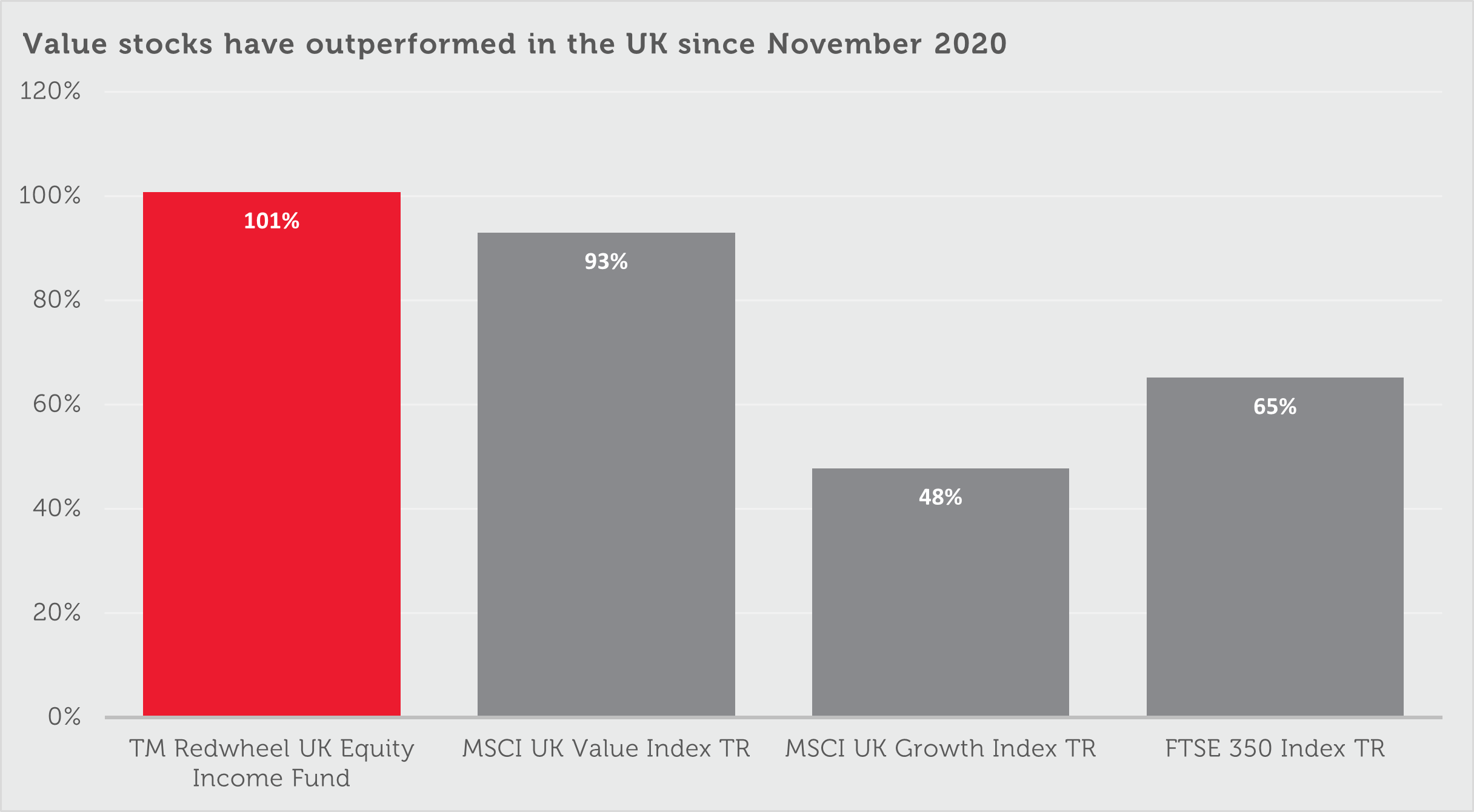
Source: Redwheel/Bloomberg on a total return basis in UK sterling from 31 October 2020 to 30 September 2024. Past performance is not a guide to future results. The prices of investments and income from them may fall as well as rise and an investor’s investment is subject to potential loss, in whole or in part. No investment strategy or risk management technique can guarantee returns or eliminate risks in any market environment.
Europe
Meanwhile, in Europe, the same phenomenon can be observed, with value beating growth across all elements of the market cap spectrum.
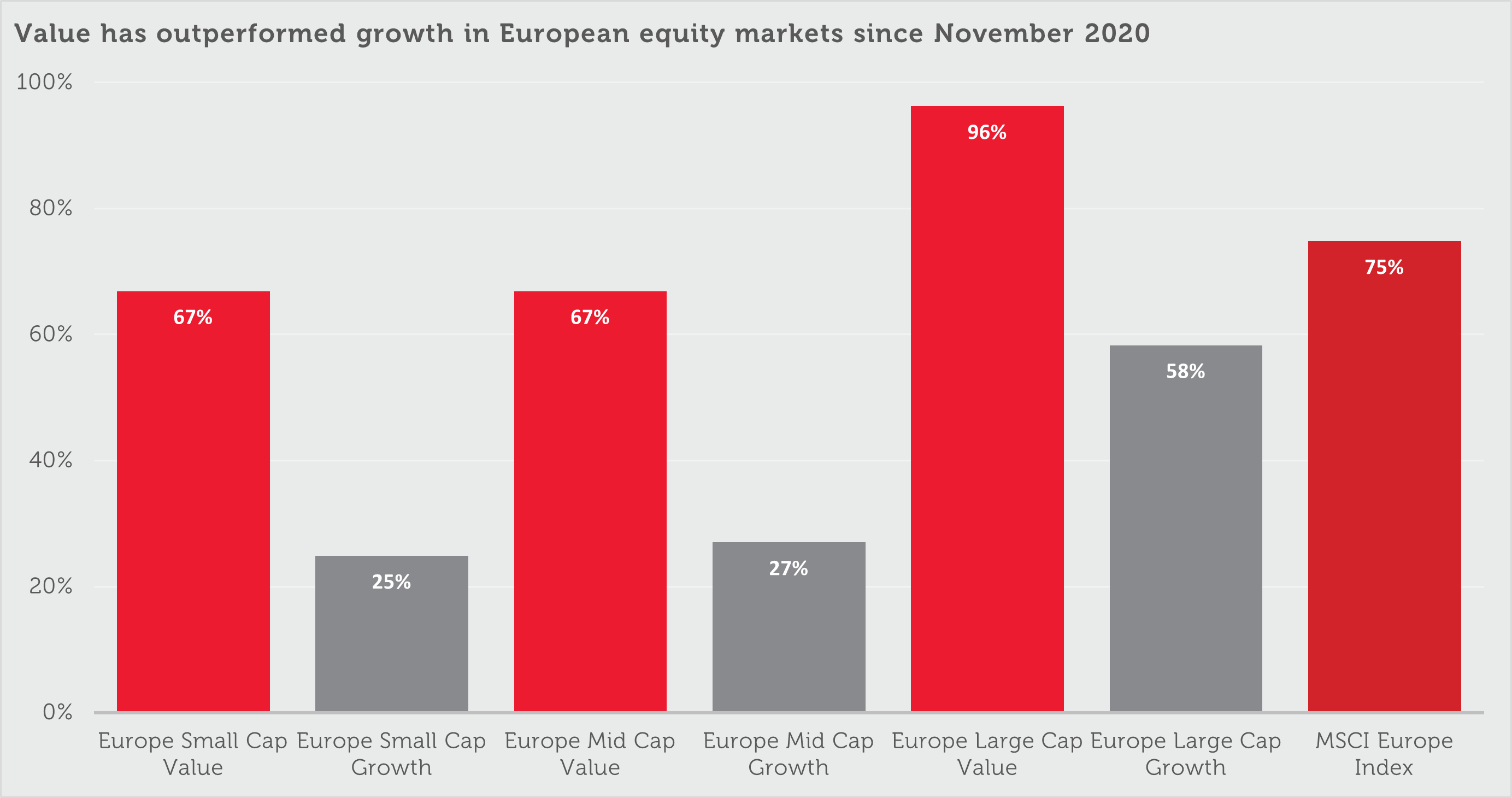
Source: Redwheel/Bloomberg on a total return basis in Euros from 31 October 2020 to 30 September 2024. Past performance is not a guide to future results. The prices of investments and income from them may fall as well as rise and an investor’s investment is subject to potential loss, in whole or in part. No investment strategy or risk management technique can guarantee returns or eliminate risks in any market environment.
Japan
The same is evidently true in Japan, with value delivering significant outperformance of growth and of the wider market, since November 2020.
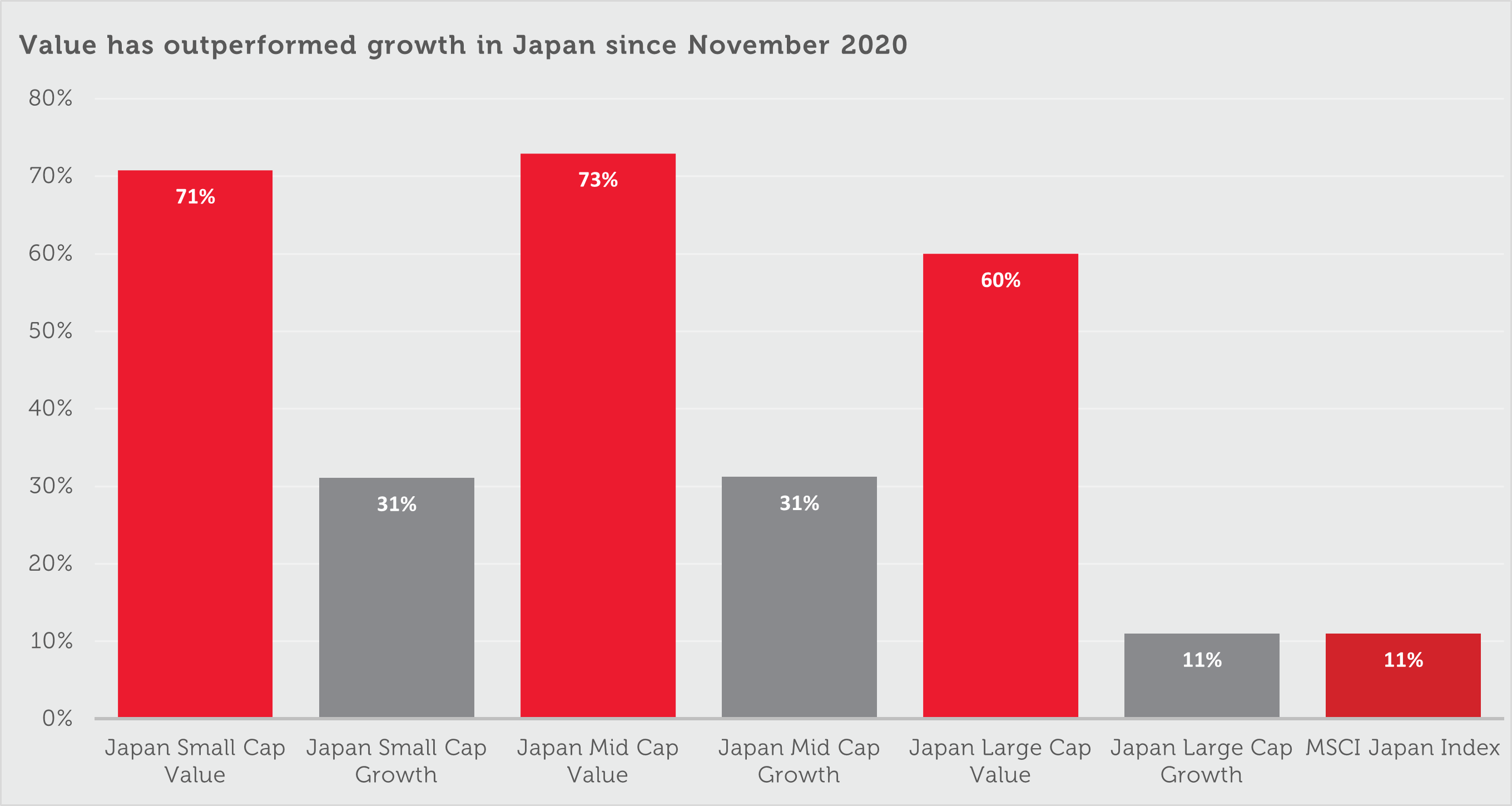
Source: Redwheel/Bloomberg on a total return basis in Japanese Yen from 31 October 2020 to 30 September 2024. Past performance is not a guide to future results. The prices of investments and income from them may fall as well as rise and an investor’s investment is subject to potential loss, in whole or in part. No investment strategy or risk management technique can guarantee returns or eliminate risks in any market environment.
US
In fact, the only place that value isn’t yet working appears to be the US. Peering beneath the surface though, we find that, even in this market, it is only within large caps that growth is still beating value.
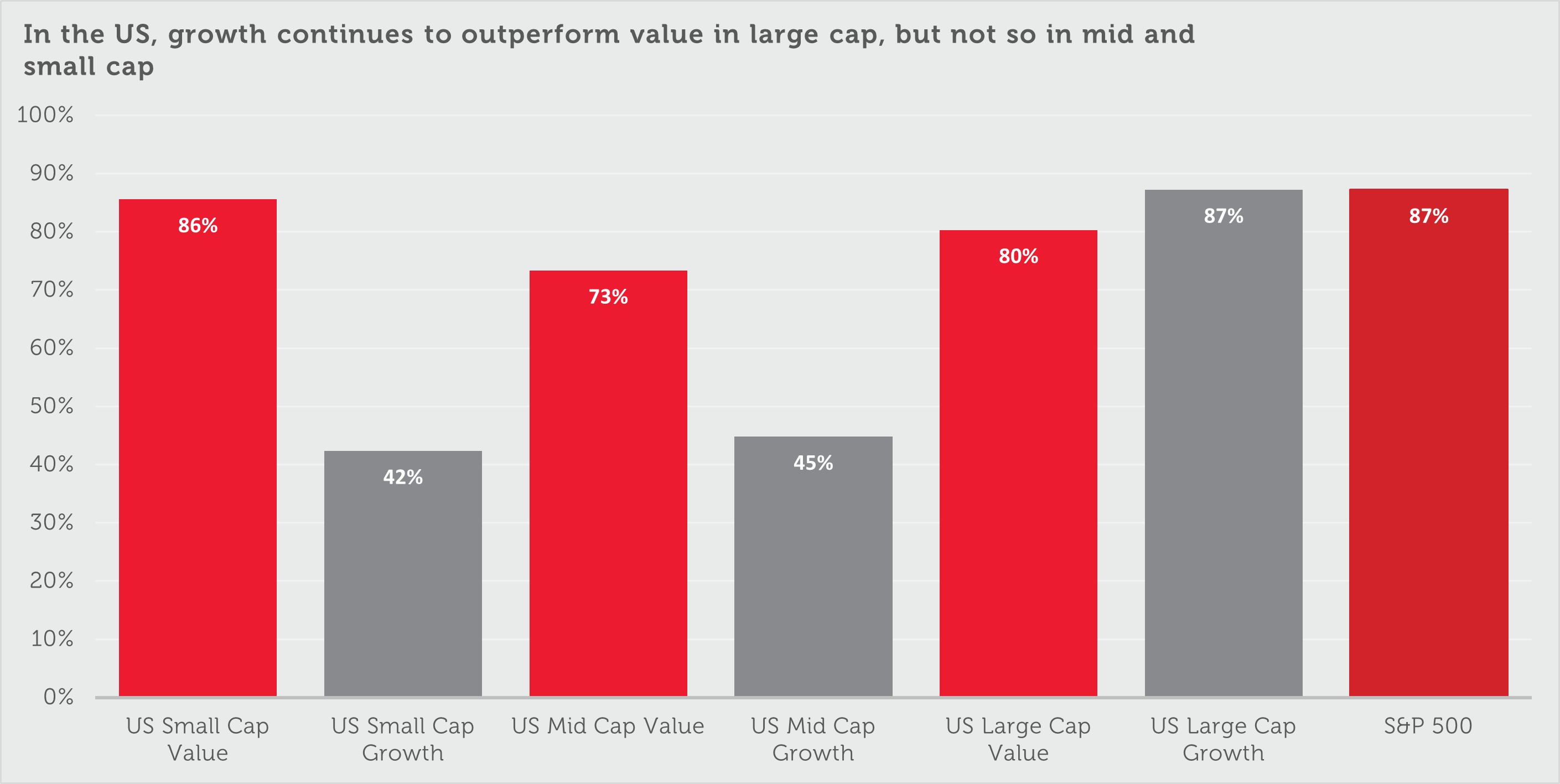
Source: Redwheel/Bloomberg on a total return basis in US dollars from 31 October 2020 to 30 September 2024. Past performance is not a guide to future results. The prices of investments and income from them may fall as well as rise and an investor’s investment is subject to potential loss, in whole or in part. No investment strategy or risk management technique can guarantee returns or eliminate risks in any market environment.
This continued outperformance of growth in the US is almost exclusively a function of that small group of stocks that have become known as “The Magnificent Seven”. Between them, these stocks have contributed more than 40% to the US stock market’s return since November 2020.

Source: Redwheel/Bloomberg on a total return basis in US dollars from 31 October 2020 to 30 September 2024. Past performance is not a guide to future results. The prices of investments and income from them may fall as well as rise and an investor’s investment is subject to potential loss, in whole or in part. No investment strategy or risk management technique can guarantee returns or eliminate risks in any market environment.
Memories can be perilously short. Many investors seem to have already forgotten the large drawdowns that some of these stocks saw in 2022, and even though it was only two years ago, they can’t seem to imagine these share prices ever going down again.
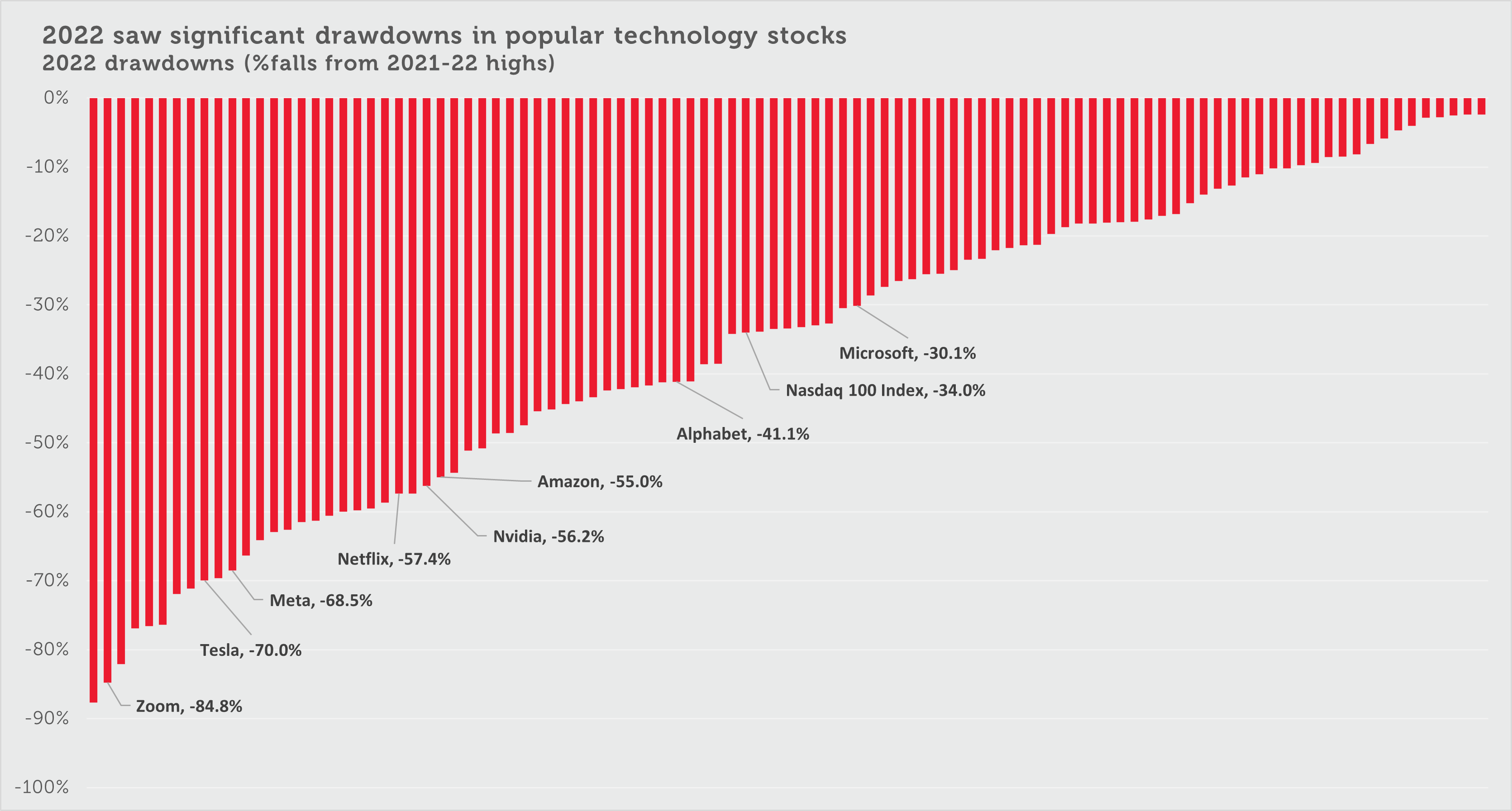
Source: Bloomberg to 31 December 2022. Past performance is not a guide to future results. The prices of investments and income from them may fall as well as rise and an investor’s investment is subject to potential loss, in whole or in part. No investment strategy or risk management technique can guarantee returns or eliminate risks in any market environment.
It ain’t over until it’s over
The long-term empirical evidence behind the concept of value investing is robust. Lowly valued stocks have outperformed in every complete decade of the last 100 years, with one exception – the 2010s. From this perspective, it is not surprising to see value reasserting itself, almost everywhere, over the last few years [1].
Indeed, the market’s continued infatuation with a handful of US technology stocks may be described as “the last shoe to drop” as far as the growth obsession of the 2010s is concerned. Everywhere else, value has resumed its former dominance.
The value renaissance has been good news for TM Redwheel UK Equity Income Fund holders, and we are confident that this will continue. We are, and always will be, disciplined value investors, and the excesses that accumulated in the era of low interest rates and quantitative easing will take a very long time to unwind. We believe this should represent a tailwind for value investors that lasts many years into the future.
In other words, there remains plenty for value investors to look forward to.
Sources:
[1] Source: Kenneth R. French library, Morgan Stanley Research. Performance of Value factor (Book Yield) since 1926, Morgan Stanley, 27 May 2022.
Key Information
No investment strategy or risk management technique can guarantee returns or eliminate risks in any market environment. Past performance is not a guide to future results. The prices of investments and income from them may fall as well as rise and an investor’s investment is subject to potential loss, in whole or in part. Forecasts and estimates are based upon subjective assumptions about circumstances and events that may not yet have taken place and may never do so. The statements and opinions expressed in this article are those of the author as of the date of publication, and do not necessarily represent the view of Redwheel. This article does not constitute investment advice and the information shown is for illustrative purposes only.

